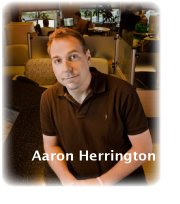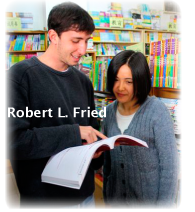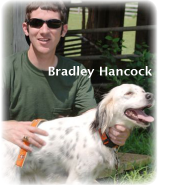 |
|
||||||
|
|
||||||||||||||||||||||||||||||||||||||||||||||||||||||||||||||||||||||||||||||||||||||||||||||||||||||||||||||||||||||
|
Risky business
by CHAD O'KANE M.A. '11
In response to times of prolonged unemployment, a renaissance of new small-business development often occurs. Not surprisingly, innovative Hokie alumni, sensing opportunity where others see only bleak economic forecasts, are harnessing the unique spirit of the entrepreneur.
Opportunity knocks
Seizing opportunity, according to Herrington, makes all the difference in the world, for opportunities don't arise every day. "Starting this business 15 years ago would not have been possible because digital [media] had not yet become so entrenched in consumers' daily lives the way it is today," Herrington said. "This was a once-in-a-generation type of opportunity, and we jumped all over it." Attention to even the most-minute details is one key to success for a small business, Herrington said. "We realize that decisions that might seem small can actually grow and evolve into much bigger opportunities." Big-picture thinking is also paramount in achieving success in the long run, Herrington added. "We are always thinking from a long-term perspective. If something looks good in the short term, but not necessarily in the long term, it's probably not a good business decision, despite how enticing it might be," he said. Herrington said that Modea is showing no signs of slowing down, with plans to double in size in the next year. Conventional wisdom debunked Starting a business in an economic climate like today's might seem more preposterous than logical. David Lohr (chemical engineering '76), executive director of the Virginia Biosciences Development Center, claimed, however, that new ventures actually make a great deal of sense in trying times. "Without question, in an environment like this, we're seeing a resurgence of entrepreneurship," Lohr said. "All of these displaced executives are finally taking the opportunity to pursue their dreams and run their own businesses." The risk for these budding entrepreneurs, Lohr explained, is greatly reduced, as they've often already lost their jobs. Furthermore, the resources necessary for a start-up, such as payroll services and legal fees, can be successfully negotiated to help new businesses run more efficiently. "Buildings are empty, lawyers are hungry, and people just want a job," Lohr said.
"I was considering quitting my job to started this company," Lu said. "But once I lost my job, I decided the timing was perfect to fulfill my dream of serving the public and promoting a compassionate and sustainable lifestyle." Lu said the purpose behind ecoVegan is to educate the public about how diets impact health and the environment. "Every sale makes a difference for health, animals, and the environment," she said. By combining passion and commitment with a unique idea, Lu was able to attract a financial partner, making the start-up feasible. The initial investment, she said, can often be the toughest hurdle. While attracting start-up capital can be a challenge, Lohr conceded, the government is helping to mitigate this difficulty by pumping federal stimulus money into entrepreneurial endeavors through grants and small-business loans, particularly those endeavors in emerging sectors that help solve problems, such as green technology. For a business idea to be successful in attracting any kind of funding, Lohr said, the potential business has to fill some kind of need.
After studying abroad in Beijing during his final semester at Virginia Tech and noticing what he considered a lack of study-abroad opportunities in southern China, Fried looked to create his own program. Though undertaking a daunting task, Fried credits the entrepreneurial spirit instilled by coming from a family of small-business owners. "I'm a third-generation entrepreneur, so I think I was prepared for [the challenge]," said Fried, who has pushed himself to become fluent in Mandarin Chinese. Fried co-founded The Chinese Language Institute, which is officially affiliated with Guangxi Normal University and promises a total immersion experience in Chinese culture. Students receive intensive, one-on-one Chinese language instruction, participate in a variety of excursions around the country, and have the option of living in integrated housing with Chinese graduate students. Setting your product apart from others is key to any successful endeavor, Fried said. "Compared with other study-abroad programs, we take a unique approach by putting equal emphasis on the living environment and the educational experience," he said.
Although Boudreaux and Hancock both have day jobs, they share a passion for Virginia, the outdoors, and hunting and attempt to imbue every customer experience with that energy. "We are firm believers in the motto, 'Do what you love, and you'll never work another day in your life,'" said Boudreaux. The entrepreneurs recovered their initial investment within months and have already expanded into outdoor clothing. Shaping entrepreneurs These Hokies credit the various lessons learned at Virginia Tech with the success they've achieved as small-business owners. Not surprisingly, faculty members in the Pamplin College of Business are doing what they can to cultivate the next crop of successful entrepreneurs. For its part, the Department of Management places a strong emphasis on a practical, hands-on approach in a variety of courses in the entrepreneurship, innovation, and technology-management option. Management Professor Devi Gnyawali teaches a course on entrepreneurial leadership and innovation in which groups of students identify business ideas, conduct feasibility studies, and create and present comprehensive business plans. "Learning by doing is the focus of this course," said Gnyawali. The key, he said, is for the students to first find an idea that will fill a need in society and then determine the feasibility of such an endeavor. More importantly, the students must possess enthusiasm for their idea. "If they don't choose an idea that they're passionate about, it won't make for a very good project," Gnyawali said. Having owned a business and consulted for small businesses before teaching at Virginia Tech, Reed Kennedy, instructor of management and director of international programs for Pamplin, brings a unique perspective to his small-business consulting classes. He knows the myriad skills one must possess in order to be a successful entrepreneur. "We look at marketing, accounting, finance, writing, operations, and anything else you need to run a successful business," Kennedy said. "You've got to know how to do it all." Kennedy believes that the U.S. educational system does not place enough emphasis on entrepreneurship. An entrepreneurial spirit and a willingness to take risks and start something new, he said, are very important, whether establishing a firm or working for a big company. "Through culture and education, we've done a disservice, preaching that you go to school and then go get a job with a big company that provides good benefits," Kennedy said. "Part of our job as educators is to cultivate the entrepreneurial spirit." That spirit, after all, is a significant thread in the fabric of this country and will ultimately help us climb out of the Great Recession, he said.
|
|
|||||||||||||||||||||||||||||||||||||||||||||||||||||||||||||||||||||||||||||||||||||||||||||||||||||||||||||||||||||
 |
||||||||||||||||||||||||||||||||||||||||||||||||||||||||||||||||||||||||||||||||||||||||||||||||||||||||||||||||||||||
|
ILLUSTRATION BY JOSH SON '11
|
|
|||||||||||||||||||||||||||||||||||||||||||||||||||||||||||||||||||||||||||||||||||||||||||||||||||||||||||||||||||||









